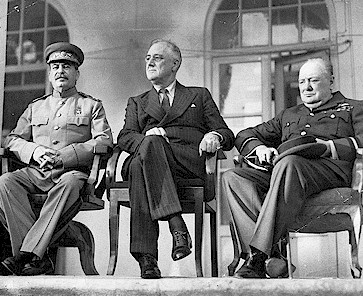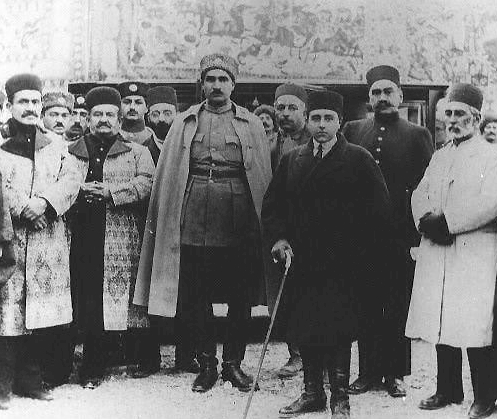History tells all if you go back far enough.
You could go back to 1813 and the Treaty of Gulistan, under which Persia was forced to concede territory to Russia. The treaty was put together by British diplomat Sir Gore Ouseley and is regarded as a humiliation in Iran. The myth - or reality - of the devious British was established. Britain was also instrumental in setting Iran's borders with India in the 1860s.
Then in the 1920s, British forces in Iran under General Edmund Ironside (later British land forces commander in World War II after Dunkirk) helped put Reza Shah on the Peacock throne. His son was Mohammed Reza Pahlavi, the Shah overthrown in the Islamic revolution of 1979, so there is a direct link back to British actions decades ago.
InAugust 1941, the Allied powers Britain,
United States, and the Soviet Union invaded
and occupied Iran by a massive air, land,
and naval assault. They justified this by
alleging that the Reza Shah had refused
to allow Iranian territory to be used to
train, supply, and act as a transport corridor
by the Allied forces. Reza Shad had declared
neutrality and wished to stay out of the
war.
The
Allies did not accept this neutrality and
invaded Iran without any respect for its
sovereignty in order to ship arms to Russia
for its war effort against Germany. Because
of its importance in the allied victory,
Iran was subsequently called "The Bridge
of Victory" by Winston Churchill.

Stalin and Churchill
in military uniform, Roosevelt in suit meet
in Tehran after invasion of Iran, 1941
Upon
occupation of Iran, the British forced the
Reza Shah to abdicate in favor of his son,
a 21 year old boy with no knowledge of politics
or statesmenship. The British wanted this
inexperienced young man as their puppet
so they could continue to rape the countries
enormous natural resources and benefit from
its geopolitical importance.
During Reza Shah's sixteen
years of leadership, major infrastructural
developments took place in Iran, most often
under his direct supervision.
There were many large road
and housing construction projects and the
Trans-Iranian Railway were built, modern
education was introduced and the University
of Tehran was established. The number of
modern industrial plants, increased nearly
20 fold under Reza Shah, the number of miles
of highway increased from 1900 to 14,300.

Reza Shah is the
tall man in the center.
In addition to the modernization
drive of the nation, Reza Shah was the leader
during the time of the Women's Awakening
(1936-1941) which sought the elimination
of the Islamic veil from Iranian society.
Modern Iranian women believed that the veil
impaired their ability to enter society
and contribute to the progress of the nation
and be regarded as an equal by men. The
unveiling issue and the Women's Awakening
are linked to the Marriage Law of 1931 and
the Second Congress of Eastern Women in
Tehran in 1932.
The British watching these
development remotely, expressed concern
in the British parliament and suggested
that Reza Shah's policies of modernization
is against British interests and they would
much prefer for Iran to remain as is so
that it would be easier to rule the region
and Iran's developments may entice other
countries to follow similar trends. The
British never hesitated to express their
displeasure for Reza Shah and held intense
views of resentment towards him.
As his reign became more
secure, Reza Shah clashed with Iran's clergy,
the Islamic class of Iran, and devout Muslims
on many issues. In December 1928 he instituted
a law requiring everyone (except Shia jurisconsults
who had passed a special qualifying examination)
to wear Western clothes which angered many
religious figures in Iran and angered devout
Muslims. The Shah also encouraged women
to discard the veil and stop hejab (head
and body covering a woman under the rules
of Islam). He announced that female teachers
could not longer come to school with head
coverings. One of his daughters reviewed
a girls' athletic event with an uncovered
head and this angered the religious right
even more.
The devout were also angered
by policies which allowed mixing of the
sexes. Women were allowed to study in the
colleges of law and medicine and in 1934
a law set heavy fines for cinemas, restaurants,
and hotels that did not open doors to both
sexes. He restricted public mourning observances
to one day and required mosques to use chairs
during these observances instead of the
traditional sitting on the floors of mosques.
This was indeed a detailed modernization
agenda even if at times it was too much
too soon and needed more time to be introduced
and widely accepted. However, many scholars
have since expressed that Reza Shah's speeches
to the parliament indicated that he had
perceived the seeds of a new war in Europe
and Iran needs to be economically, militarily,
and politically better prepared to avoid
being sucked into the war.
Reza Shah believed in independence
and neutrality in matters of foreign relations
and did not have any desire to participate
in global polarization and worked to balance
British influence with other foreigners
and generally to diminish foreign influence
in Iran altogether. Again this irritated
the British immensely.
On 21 March 1935, Reza Shah
had issued a decree asking foreign delegates
to use the term Iran in formal correspondence
in accordance with the fact that Persia
was a term used for a country identified
as Iran in the Persian language. It has
however contributed more to the Iranian
people than others, particularly its language.
The name Iran means “Land of the Aryans”.
The British assumed that this may be somehow
an indication of Iranian leader's desire
to become closer with the Aryan race of
Germany.
In 1931, Reza Shah refused
to allow British Imperial Airways to fly
in Persian airspace, instead giving the
concession to German-owned Lufthansa Airlines
and later surprised the British by unilaterally
canceling the oil concession awarded William
Knox D’Arcy (then called Anglo-Persian
Oil Company), which was slated to expire
in 1961.
The concession granted Persia
(which what Iran used to be named) 16% of
the net profits from AIOC oil operations.
The Shah wanted 21%. Following a brief challenge
by the British before the League of Nations,
the British acquiesced. However in 1972
the Vice President of British Petroleum
confessed that the British were taking more
than 99% of the profits from Iranian oil
and giving less than 1% to Iran - and even
then the money was directed towards British
supporters in Iran rather than the whole
population. The Iranians were not allowed
to review or audit the accounting books
of AIOC (the so called Anglo-Iranian Oil
Company, now known as British Petroleum).
Reza Shah had previously
hired American consultants to develop and
implement Western-styled financial and administrative
systems, which included the U.S. Economist,
Dr. Arthur Millspaugh who acted as the nation's
Finance Minister.
Reza Shah also purchased
ships from Italy and hired Italians to teach
his troops the intricacies of naval warfare.
He also began bringing in hundreds of German
technicians and advisors for various mining
and roadwork projects. Mindful of the Persian’s
long period of subservience to British Empire's
enormous military power and the Russian
brutal conduct as Iran's neighbor, Reza
Shah was careful to avoid giving any one
foreign nation too much control.
He also insisted that foreign
advisors be employed by the Persian government
so that they would not be answerable to
foreign powers. This was based upon his
experience with Anglo-Persian which was
owned and operated by the British government
and has caused problems for Iran for more
than a century.
In his campaign against
foreign influence he annulled the 19th century
capitulations to Europeans in 1928. Under
these, Europeans in Iran had enjoyed the
privilege of being subject to their own
consular courts rather than to the Iranian
judiciary. The right to print money was
moved from the British Imperial Bank to
Iran's National Bank (Bank-i Melli Iran),
as was the administration of the telegraph
system from the Indo-European Telegraph
Company to the Iranian government, in addition
to the collection of customs by Belgian
officials. He eventually fired Millspaugh,
and prohibited foreigners from administering
schools, owning land or traveling in the
provinces without police permission. To
many Intellectual Iranians of the time,
Reza Shah was indeed an Iranian hero and
all his achievements were a testament to
his strong character and love for Iran and
her people.
Of course this is precisely
what empires despise and find threatening:
a sovereign nation's independence and self-sufficiency.
When Britain declared war
on Germany, it was bad news for Iran. Reza
Shah's foreign policy, which had consisted
essentially of playing the Soviet Union
off against Britain, failed when those two
powers joined in 1941 to fight the Germans
and supply the Soviet forces with war material
through Iran. Hence the two allies, along
with United States, jointly attacked, invaded,
and occupied the country in August 1941,
with Franklin D. Roosevelt's blessings.
The
British insisted that Reza Shah must abdicate
and he remained as a prisoner in British
territories, first in Mauritius, then in
Durban and finally in Johannesburg, South
Africa, where he died on July 26, 1944. |